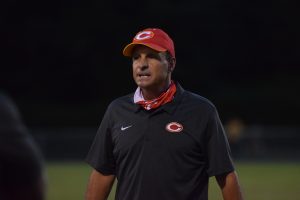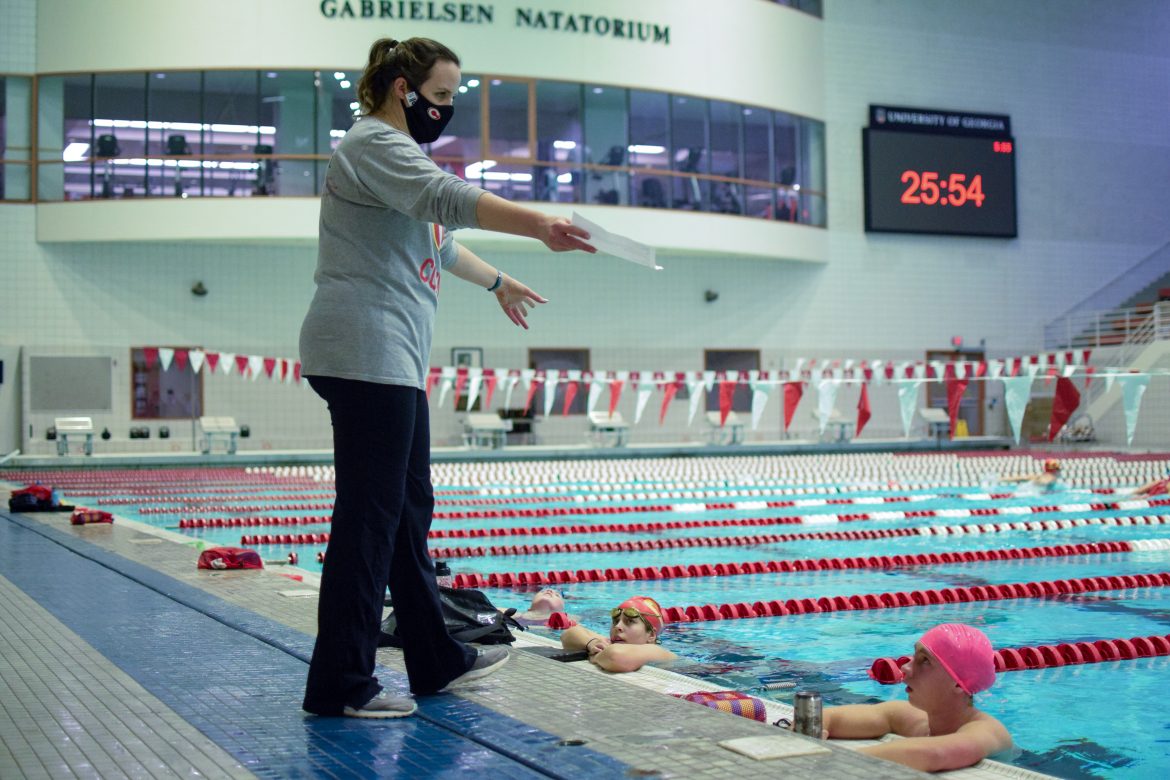Clarke Central High School swimming and diving coach Emily Hulse stands in the Gabrielsen Natatorium in front of the swimming lanes counting laps. CCHS senior Katie Sue Martin-Williams is disheartened by not having swim meets in-person due to COVID-19 restrictions. “I will say it’s a bit sad, because we’re obviously not going to be having meets. Instead of having meets for 200 people come in along with their families, we’re doing something where every team goes to their pool, and then times themselves and records it to the meet.” Martin-Williams said. Photo by Luna Reichert
Contact tracing has become a significant method for tracking COVID-19 cases at CCHS.
Since the start of the COVID-19 pandemic, Clarke Central High School sports teams have been COVID testing student athletes and adding regulations and guidelines for practices and games to prevent the spread of the virus.
The Georgia High School Athletic Association implemented guidelines for Georgia high schools to adhere to once fall sports seasons began.
“If there’s a positive response to any other questions or they have a fever, then they are eliminated from practice or playing in the game, and then coaches are supposed to refer those students to me, so I can contact trace,”
— Iveta Rabb,
CCHS nurse
“GHSA provided the guidelines for how students would interact in sports. Our first sports brought back was football on both campuses,” Clarke County School District Communications Manager Beth Moore said. “So our athletic trainers and our athletic directors and coaches got the guidelines from GHSA to work with students and parents and implemented our procedures at those schools, per GHSA guidelines.”
According to CCHS nurse Iveta Rabb, such guidelines are standard screening questions for athletes and coaches to answer prior to attending practice or games.
“(They are asked) standard questions to find out if they have been in contact with anyone who has COVID, or if they have symptoms of COVID,” Rabb said. “If there’s a positive response to any other questions or they have a fever, then they are eliminated from practice or playing in the game, and then coaches are supposed to refer those students to me, so I can contact trace.”
Rabb believes COVID-19 testing is even more important for athletes because they have a higher risk of contracting the virus due to being closer to other players, especially in contact sports.
“So you can imagine a higher risk, or at least a higher risk for contracting COVID might be football. Or as a lower risk it might be tennis or because you can quickly distance in tennis or track. But it’s much harder to do that with football,” Rabb said.
The CCHS varsity football team has been taking precautions to minimize the risk of COVID-19. According to CCHS football head coach David Perno, there have not been any cases among the team.

Clarke Central High School head varsity football coach David Perno walks along Death Valley during the CCHS vs. Cedar Shoals High School football game on Sept. 4, 2020. Perno believes the CCHS football program is taking the necessary precautions to prevent the spread of COVID-19 among the team. “When we’re done (with practice) yeah, they need to put the mask on and, take care of themselves away from here. When they’re here with the (COVID-19) screening, I gotta think it’s working because we take temperatures and nobody’s bringing it in, and so far so good,” Perno said. Photo by Luna Reichert
“We have to wear a mask, whether it’s in the weight room or in film, or walk through, and then once we go to visit the field, they don’t have to wear masks at practice or games,” Perno said. “You just gotta be cautious. We’re not letting kids come in with any type of symptoms. Fortunately for us, they’ve done a good job. No one has brought into our facility, so we haven’t had a lot of issues with having to deal with it.”
Despite the new restrictions, Perno finds regulating football practice difficult.
“During the game times, there’s not much you can do. As far as once activity starts outside, maybe you (can) try and social distance, but it’s just hard in football,” Perno said.
Since the start of the swimming season in November, CCHS swim coach and foreign language department chair Emily Hulse has put many rules in place to prevent the spread of COVID-19 and make contact tracing easier.
“Every swimmer is assigned to a specific lane so that we can contact trace much more easily if we need to,” Hulse said. “Other than in the water, swimmers are expected to keep six feet away from others all the while keeping their masks on. Swimmers are screened for fever before practice. They must also fill out ‘Dawg Check’ which is a UGA form online where they answer questions about possible symptoms and exposure to COVID-19, in addition to the Clarke Central Google Form for contact tracing. I have not yet had any coronavirus cases.”
“It hasn’t been that bad actually, in fact, the practices have actually been better, because we get more done,”
— Katie Sue Martin-Williams,
CCHS swimmer and senior
CCHS swim team member Katie Sue Martin-Williams, a senior, views the increased regulations on swim practice positively.
“It hasn’t been that bad actually, in fact, the practices have actually been better, because we get more done,” Martin-Williams said. “We don’t have to worry as much about facets of the lane. We’re all in separate places, and we’re not having tons of people in one area.”
CCHS wrestling coach Shane McCord says GHSA protocols have impacted wrestling competitions.
“So as far as protocols for matches, we’re limited to two teams per wrestling match now,” McCord said. “So, how many matches your gym can hold is how many teams can go. So most gyms can only hold three matches so they can only invite 16 (people). It has cut down on the number of events that we can do and some counties are placing restrictions on how many people can be there, period. The numbers are limited so you have to pick and choose wisely.”
Despite the challenges of the pandemic, McCord remains hopeful about the future of wrestling at CCHS.
“I think (wrestling is) going to be okay, especially once we get more knowledgeable about COVID, itself, and learning what exactly brings it on.”
Story by Carolina Turner
Package by Gretchen Hinger
